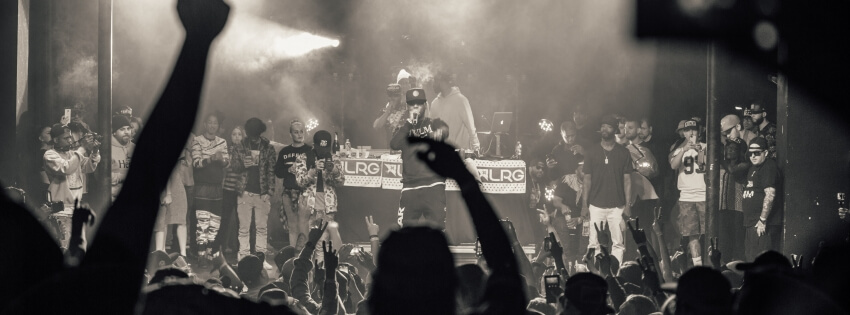
Prosecutors Used Rap Lyrics as Evidence in a Murder Trial; that’s Racial Bias
Rap lyrics are protected free speech under the First Amendment. But all too often in trial after trial of Black men, prosecutors introduce this form of artistic expression to secure convictions for serious crimes carrying long prison sentences. Simply put, rap is unfairly seen in the courts, not as an art form, but as inherently incriminating evidence.
In an effort to prevent this kind of racial bias from infecting criminal proceedings, the ACLU of Northern California supported the passage of the Racial Justice Act in 2020. The new law makes it illegal for the state to convict or sentence someone based on their race, ethnicity, or national origin. If, during a criminal proceeding, a prosecutor, judge, or witness uses racially coded language or exhibits racial animus (whether purposefully or not), then that defendant can file a motion challenging his conviction. Under the Act, a defendant can also bring a challenge if there are any racial disparities in relevant charging or sentencing decisions.
On Friday, October 1, a Contra Costa County judge is set to hold what we believe is the first evidentiary hearing under the Racial Justice Act; it will be a major test of the new law. At issue is whether prosecutors exhibited racial bias or prejudice toward Gary Bryant Jr., a Black man and a prolific musician, by using Bryant's rap lyrics and rap videos as evidence during his trial for the murder of 23-year-old Kenneth Cooper.
Cooper was fatally shot in his car during a chaotic scene in the parking lot of an Antioch apartment complex. Bryant, who was actually shot first that evening, said that he had been the victim of a robbery, and fired his gun in self-defense. But the prosecution argued that Bryant and a co-defendant had shot Cooper for the benefit of the "Broad Day" gang, and they used Bryant’s lyrics to prove this theory.
At issue is whether prosecutors exhibited racial bias or prejudice toward Gary Bryant Jr., a Black man and a prolific musician, by using Bryant's rap lyrics and rap videos as evidence during his trial for the murder of 23-year-old Kenneth Cooper.
At trial, Bryant, who had no violent criminal history, testified that he was not in the Broad Day gang and had no gang-affiliation. Nor was it ever proven by the prosecution that Cooper was a part of a rival gang. Nonetheless, a self-proclaimed gang expert with no knowledge of rap or hip-hop twisted Bryant's lyrics—some of which were just refrains from popular songs—into literal confessions of gang activity.
This "expert," speaking in racially charged terms and using racial epithets, interpreted Bryant’s lyrics with a vague or general meaning as being much more sinister or violent. He testified, for example, that "to lay a demo" means "to make a shooting," when that phrase has a much more obvious interpretation as making a demo recording of one's music. And according to the expert, "geeked up," which in common slang means "being intoxicated," actually means "being armed with a firearm." Throughout the trial, the prosecution witness ignored the common practice of metaphor and mimicry, claiming that, when Bryant copied lyrics from other more popular songs about shootings and violence, he was really just confessing to his own violent acts.
The expert also claimed that Bryant’s display of a "B" hand symbol in a rap video conclusively demonstrated his affiliation with the Broad Day gang—even though Former President Bill Clinton, Golden State Warrior Steph Curry, actor William Shatner, and singer Beyoncé Knowles all have been pictured making the same hand symbol and are not known members of Broad Day.
In the end, the jury—which, by design, had no Black people on it after the prosecution had excluded all six prospective Black jurors based on their negative prior experiences with law enforcement—found Bryant guilty of murder with enhancements for gang activity. The court handed Bryant a life sentence.
In the end, the jury—which, by design, had no Black people on it after the prosecution had excluded all six prospective Black jurors based on their negative prior experiences with law enforcement—found Bryant guilty of murder with enhancements for gang activity. The court handed Bryant a life sentence.
At the evidentiary hearing on Friday, Bryant will present three expert witnesses, academics from around the country, who will detail the racial bias that arises when we put rap on trial, testifying that rap lyrics cannot be divorced of context or culture in the courtroom. The experts will also explain that, in the majority of cases where music lyrics are introduced as evidence, the defendant is Black.
It is because of cases like Bryant’s that the ACLU worked to support the passage of the Racial Justice Act and why we are now fighting to make sure that it is put into practice and not just words on paper. This month, we filed an amicus brief calling out prosecutors’ unwillingness to disclose information that might help stop discriminatory law enforcement and prosecutorial practices. ACLU California Action is also now sponsoring legislation to make the law retroactive.
The Racial Justice Act should be interpreted robustly, as the California Legislature intended. A judge should not be permitted to look the other way when both the prosecutor and the prosecution’s central witness make unfounded allegations that a person’s rap lyrics must be used to classify him as a gang member involved in violence.
It’s time for this unconstitutional, double standard to stop.
Chessie Thacher is a Staff Attorney for the Democracy & Civic Engagement program at the ACLU of Northern California, where she devotes her time to First Amendment issues, government transparency, criminal justice reforms, and voting rights litigation.
